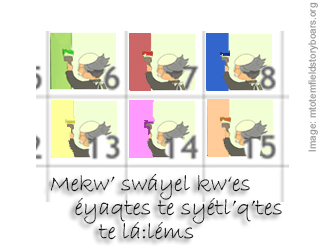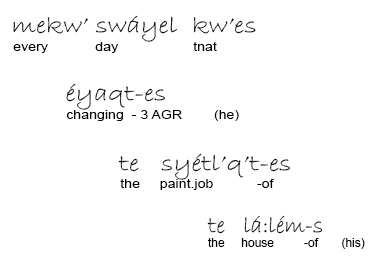Mekw’ swáyel kw’es éyaqtes te syétl’q’tes te lá:léms means ‘Every day he changes his house’s paint’, or ‘Every day he re-paints his house’.
Literally it means ‘Every day (it is) that (he) changes the paint-job of his house’.
Vocabulary and Pronunciation
- mekw’ – every
- swáyel – day
- kw’es – that
- éyaqt – changing (this is a variant of iyáqt – change (it)
- -es – here the –es ending marks agreement with a ‘third person’ (i.e. not me or you) as the subject. In this sentence, the subject is the understood ‘he‘
- te – the
- syétl’q’t – paint job
- -s – of
- lá:lém – house
- -s – here the –s means ‘of‘, indicating that the house is possessed by understood ‘he‘
Audio: Elizabeth Herrling
Structure
The structure of this phrase is as follows:
- Literally you say every day that…, not just every day… .
- The subject of the verb éyaqt is an understood ‘he‘. Verbs like éyaqt require an –es ending when the subject is a ‘third person’ (someone other than you or me). Linguist call this type of ending ‘3rd person agreement’, labelled ‘3 AGR’ above.
- The –s endings on the nouns syétl’q’t and lá:lém mark possession by a ‘third person’ (someone other than you or me).
- Literally, the end of the phrase means something close to ‘the paint job of the house of (him/his)‘, where him/his is just understood from context.



No comments yet.